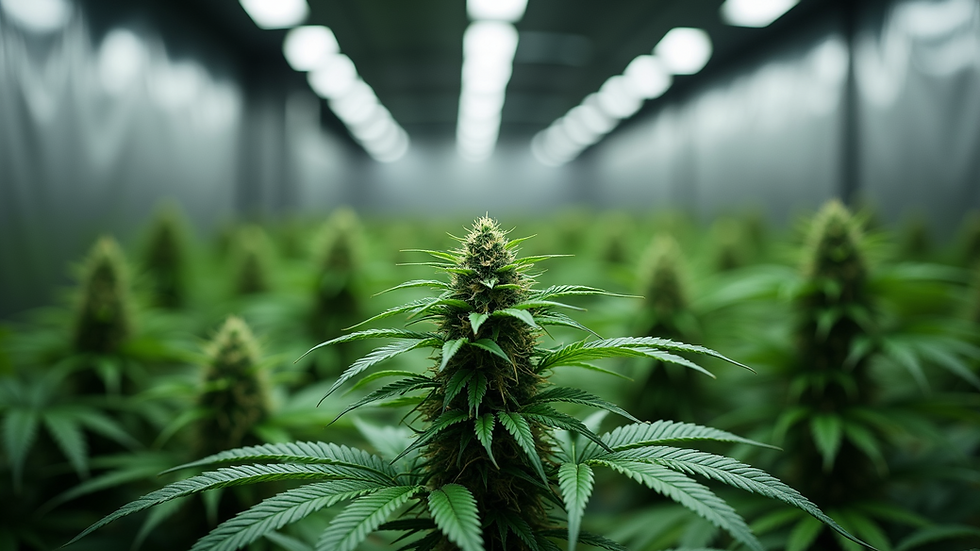How Commodity Exchanges are Revolutionizing the Cannabis Industry
- Celso Hamelink
- Apr 21, 2025
- 4 min read
The cannabis industry is undergoing a significant transformation, driven by the emergence of commodity exchanges. These platforms are changing how cannabis products are traded, creating a more organized, transparent, and efficient market. As marijuana becomes legalized in more regions, the need for a structured trading system is becoming increasingly essential. This article explores how commodity exchanges are revolutionizing the cannabis industry.
Understanding Cannabis Exchanges
Cannabis exchanges serve as platforms where buyers and sellers can connect to trade cannabis products. They streamline the trading process, allowing for greater efficiency compared to traditional methods. With the rise of these exchanges, industry players can benefit from improved pricing transparency and reduced transaction costs.
According to a report by Grand View Research, the global legal cannabis market is expected to reach USD 73.6 billion by 2027. As the market expands, exchanges are instrumental in establishing a standardized approach, which is critical for both producers and consumers. These platforms help facilitate transactions that are consistent and compliant with regulations, thereby building trust among market participants.

The Rise of a Structured Market
Historically, cannabis trading has faced challenges due to the lack of regulation and standards. In responsive action to these challenges, commodity exchanges have introduced organized structures for trading. By allowing standardized contracts and quality assurance checks, these platforms provide a mechanism that reduces market risks.
In addition, commodity exchanges are enabling better access to market data for stakeholders. They publish information on pricing, trends, and overall market conditions, empowering traders with the knowledge needed to make informed decisions. With data-driven insights, businesses can adapt their strategies and remain competitive in this evolving landscape.

What is the Wholesale Cannabis Platform Legit?
When discussing cannabis exchanges, it’s important to understand the legitimacy and reliability of wholesale cannabis platforms. A legitimate wholesale cannabis platform ensures compliance with local regulations, thus providing a secure environment for transactions. Validating the credibility of these platforms involves inspecting their licenses, user reviews, and the quality of service offered.
For example, established platforms typically have stringent quality control measures and relationships with testing labs to ensure product safety. They also provide transparent transactions, where the parties involved can track each step of the process. By adhering to these standards, wholesale platforms maintain trust between producers and consumers.
Examples:
GreenLeafs Biomed is an example of a legitimate wholesale platform. Their approach to transparent pricing and quality assurance shows their commitment to the industry.
LeafLink, another noteworthy platform, allows retailers to access a broad selection of products from verified suppliers while ensuring compliance.

The Benefits of Trading on Cannabis Exchanges
Commodity exchanges bring numerous advantages to the cannabis industry. Here are a few key benefits:
Enhanced Liquidity
By aggregating multiple buyers and sellers, commodity exchanges create a more liquid market. This liquidity allows participants to buy and sell cannabis products more easily, ultimately leading to better price discovery. As a result, businesses can adapt their inventory levels more effectively to meet demand.
Risk Mitigation
Commodity exchanges help mitigate risks associated with price fluctuations. By providing futures contracts, they allow traders to secure prices for future transactions. This hedging mechanism is essential for growers facing the uncertainty of fluctuating market prices.
Streamlined Transactions
The use of digital platforms simplifies transactions, leading to faster deal closures. Rather than dealing with inefficient manual processes, business owners can utilize a robust online system for trading. This streamlining can reduce errors and transaction times, leading to increased productivity for all parties involved.
Networking Opportunities
Exchanges also create networking opportunities in the cannabis industry. Producers, distributors, and retailers can connect with each other, fostering collaborations that can lead to innovation and development within the sector. By interacting within a structured platform, industry players can share insights and strategies.
Future Outlook for Cannabis Exchanges
As the cannabis market matures, commodity exchanges will play a crucial role in shaping its future. The continued expansion of legalization across different regions is expected to drive the growth of these platforms. With more products entering the market, there will be an increased need for established trading avenues to handle the complexities.
Furthermore, advancements in technology will likely enhance the capabilities of cannabis exchanges. Automated trading systems, artificial intelligence for analytics, and blockchain for transaction transparency can revolutionize how cannabis is traded altogether. This digital evolution will allow for real-time trading and provide invaluable data to participants.
Incorporating futures and options in cannabis trading will also become more prevalent. By adopting traditional financial practices, commodity exchanges will ensure that the cannabis marketplace can function like more established industries.
Moving Forward with Confidence
In summary, commodity exchanges are revolutionizing the cannabis industry by structuring trading processes, enhancing liquidity, and providing opportunity for networking. As the market continues to grow, engaging through a reliable cannabis trading platform will become essential for both producers and retailers.
With the right strategies and tools in place, businesses can navigate the complexities of the cannabis industry confidently. As exchanges evolve, they will undoubtedly become a fundamental component of the cannabis landscape, driving innovation and ensuring its longevity.
Navigating the future of the cannabis industry doesn’t have to be daunting. With the emergence of commodity exchanges and the advantages they offer, stakeholders can engage in more organized and efficient trading practices. As the industry grows, the importance of these platforms will only increase, leading to a more vibrant and flourishing cannabis market.




Comments